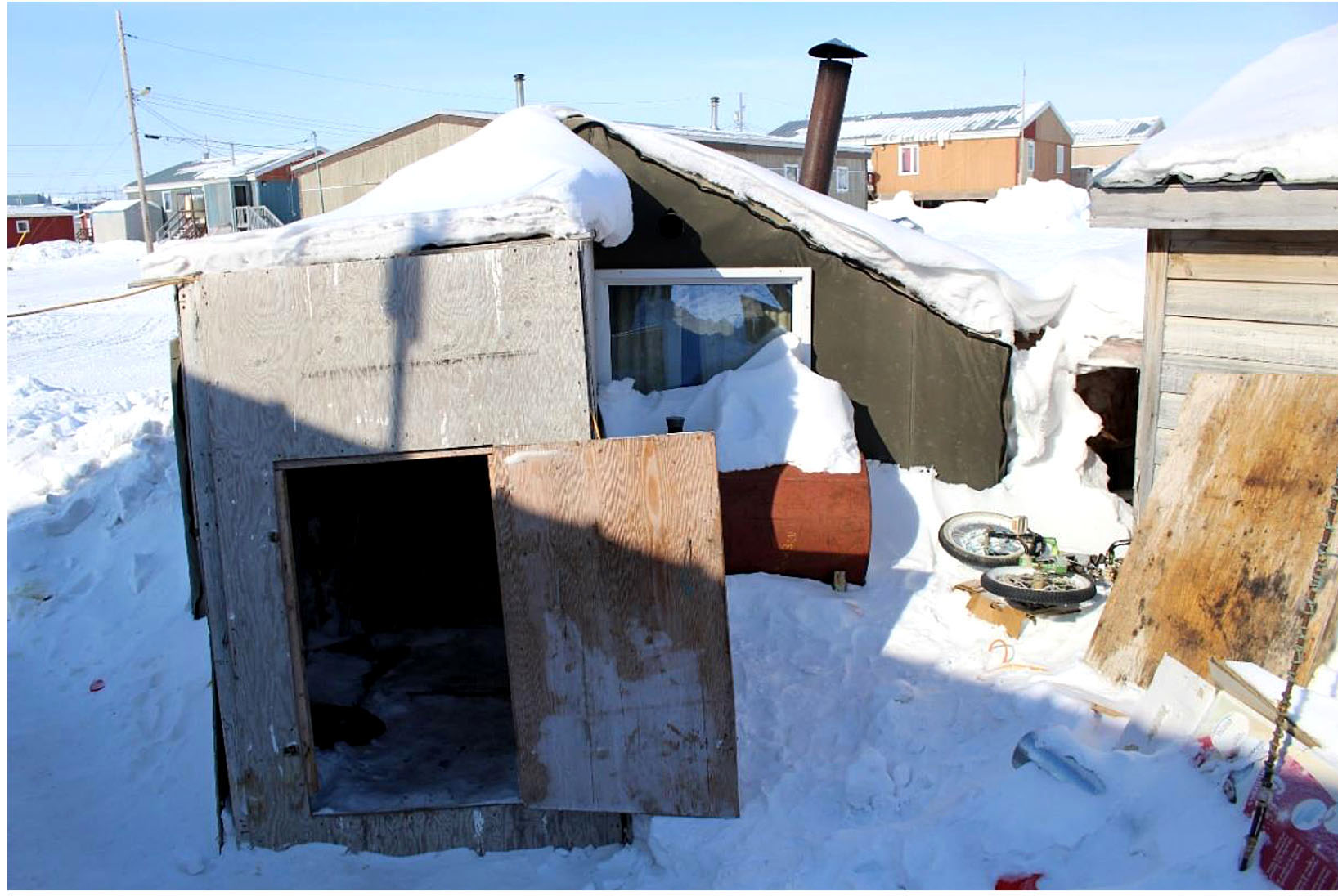Liberal government’s 2017 budget leaves Nunavut waiting for details
Ottawa’s latest housing commitment amounts to only $21.8M per year

This poorly constructed wooden shed in Igloolik housed a young family at the time the photo was taken. On March 1, a Senate committee report said the housing shortages that plague the four regions of Inuit Nunangat represent a public health emergency, but Finance Minister Bill Morneau’s March 22 budget pledges only about $21.8 million a year over 11 years for housing in Nunavut. (IMAGE FROM SENATE COMMITTEE REPORT)
Updated at 12:30 p.m.
The carefully crafted budget message that Bill Morneau, the federal finance minister, delivered March 22 contains many tantalizing items that may or may not improve the lives of people of Nunavut, but no one can know what most of it means until the hard details emerge later.
That’s because the Liberals’ spending promises are embedded inside various funds and programs that have yet to be created, such as their highly touted Canada Infrastructure Bank.
“Across the country, we’re building stronger communities,” Morneau said, in a speech that bragged incessantly about the Liberal government’s past policy measures, such as the Child Tax Benefit.
For Nunavut, the most concrete measure Morneau announced was a promise to spend $240 million on housing—spread over 11 years, and not starting until 2018-19.
That means the housing commitment to Nunavut is worth only about $21.8 million a year.
Annually, that’s much less than the $76.7 million for social housing that Morneau’s government announced for Nunavut in his 2016 budget speech.
And the other two territories get even less: $36 million over 11 years for the Northwest Territories and $24 million for Yukon.
That however, didn’t stop the federal government from claiming they’ll help house thousands of northern families.
“These investments, provided as a top-up to the Investment in Affordable Housing initiative and the new multilateral investment framework, will help approximately 3,000 northern families find adequate, suitable and affordable housing,” says a budget document tabled March 22.
In a polite statement, the Government of Nunavut did not criticize Morneau’s budget, but also suggested Nunavut needs more.
“This will mean a slow and steady pace of longer term investments towards continued northern housing,” the statement said.
On two of Nunavut’s biggest infrastructure dreams, the Grays Bay road-port project in the Kitikmeot and a Kivalliq-Manitoba road, Morneau’s budget offered nothing but silence.
But Finance Minister Keith Peterson said the GN hopes Nunavut can use money from a new pot of federal cash called the “National Trade Corridors Fund,” which will make $2 billion available over 11 years for transportation infrastructure that are critical to the national economy, especially ports, railways and highways.
“The GN will work with Canada to determine how this funding may be applied to projects like the Gray’s Bay Road Project and/or a transportation corridor in the Kivalliq,” Peterson’s statement said.
However, the federal government budget document merely says they will “will look for ways to improve the flow of supplies to northern communities, unlock economic development in Canada’s three territories, and create good, middle class jobs.”
The federal government also said “investments will also be made to resolve critical transportation needs in Canada’s north,” but did not state what kinds of projects they’re looking at or how much they’re prepared to spend.
Morneau’s budget is equally vague on another long-standing Nunavut demand: money to replace the Qulliq Energy Corp.’s aging fleet of diesel power plants.
But it does promise the creation of an Arctic Energy Fund, worth $400 million over 10 years, though that money won’t start flowing until 2018-19.
Peterson’s statement said dollars from the Arctic Energy Fund would be administered through bilateral agreements between Nunavut and Canada.
And Peterson said Nunavut will continue to press the federal government to make them aware of Nunavut’s needs.
“Nunavut faces unique challenges, especially related to housing and energy. We have encouraged the federal government to invest in these areas for some time,” Peterson said.
“This budget is a positive next step, and we now look forward to working out the details. As always, we will make our needs understood and advocate for critical funding for Nunavut,” he said.
Nunavik’s Makivik Corp. also took issue with the lack of funding for northern housing. Nunavik leadership has been in negotiations with Ottawa for years towards a catch-up program to help alleviate the region’s housing shortage, estimated at about 1,000 units.
“Makivik is disappointed there is no direct social housing funding announced for Nunavik in the 2017 federal budget,” Makivik said in a March 23 release.
“We are hopeful that long term social housing direct funding for Nunavik is contained in the National Housing Fund ($5-billion over 11 years), which will allow planning and housing construction to continue uninterrupted in 2018.”
Other budget highlights include:
• higher taxes on tobacco and liquor, which take effect March 22;
• $54 million for the Territorial Health Investment Fund, to help defray the high costs of northern health care;
• $13.7 million to pay for the three Crown-Indigenous partnership agreements reached last winter, including the Inuit-Crown partnership deal signed by Prime Minister Justin Trudeau and Inuit Tapiriit Kanatami President Natan Obed;
• $86 million to beef up the Non-Insured Health Benefits program, to fund medical travel escorts for expectant moms and mental health professionals, including traditional healers;
• $2 billion over 11 years for infrastructure in remote and rural communities, to be divided up on a base-plus-per-capita formula, but with no reported amount for Nunavut;
• various pieces of funding for climate change adaptation, including $73.5 million for a Canadian Centre for Climate Services;
• $21.4 million for Indigenous and Northern Affairs Canada, for energy conservation in the North; and,
• $89.9 million for programs aimed at preserving and promoting Indigenous languages and cultures.
The budget was also silent on a longstanding Nunavik demand: a catch-up social housing construction program for the territory.
Nunavut’s independent MP, Hunter Tootoo, praised Morneau’s budget in a statement.
“It’s gratifying to see that the government has heard and acted on the needs of Nunavut. This is a good start,” Tootoo said.





(0) Comments